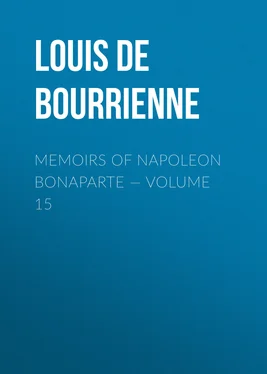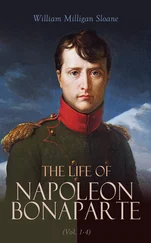Louis Bourrienne - Memoirs of Napoleon Bonaparte — Volume 15
Здесь есть возможность читать онлайн «Louis Bourrienne - Memoirs of Napoleon Bonaparte — Volume 15» — ознакомительный отрывок электронной книги совершенно бесплатно, а после прочтения отрывка купить полную версию. В некоторых случаях можно слушать аудио, скачать через торрент в формате fb2 и присутствует краткое содержание. Жанр: Биографии и Мемуары, История, foreign_edu, foreign_antique, foreign_prose, на английском языке. Описание произведения, (предисловие) а так же отзывы посетителей доступны на портале библиотеки ЛибКат.
- Название:Memoirs of Napoleon Bonaparte — Volume 15
- Автор:
- Жанр:
- Год:неизвестен
- ISBN:нет данных
- Рейтинг книги:5 / 5. Голосов: 1
-
Избранное:Добавить в избранное
- Отзывы:
-
Ваша оценка:
- 100
- 1
- 2
- 3
- 4
- 5
Memoirs of Napoleon Bonaparte — Volume 15: краткое содержание, описание и аннотация
Предлагаем к чтению аннотацию, описание, краткое содержание или предисловие (зависит от того, что написал сам автор книги «Memoirs of Napoleon Bonaparte — Volume 15»). Если вы не нашли необходимую информацию о книге — напишите в комментариях, мы постараемся отыскать её.
Memoirs of Napoleon Bonaparte — Volume 15 — читать онлайн ознакомительный отрывок
Ниже представлен текст книги, разбитый по страницам. Система сохранения места последней прочитанной страницы, позволяет с удобством читать онлайн бесплатно книгу «Memoirs of Napoleon Bonaparte — Volume 15», без необходимости каждый раз заново искать на чём Вы остановились. Поставьте закладку, и сможете в любой момент перейти на страницу, на которой закончили чтение.
Интервал:
Закладка:
Fouche never regarded a benefit in any other light than as the means of injuring his benefactor. The King, deceived, like many other persons, by the reputation which Fouche's partisans had conjured up for him, was certainly not aware that Fouche had always discharged the functions of Minister in his own interest, and never for the interest of the Government which had the weakness to entrust him with a power always dangerous in his hands. Fouche had opinions, but he belonged to no party, and his political success is explained by the readiness with which he always served the party he knew must triumph, and which he himself overthrew in its turn. He maintained himself in favour from the days of blood and terror until the happy time of the second Restoration only by abandoning and sacrificing those who were attached to him; and it might be said that his ruling passion was the desire of continual change. No man was ever characterised by greater levity or inconstancy of mind. In all things he looked only to himself, and to this egotism he sacrificed both subjects and Governments. Such were the secret causes of the sway exercised by Fouche during the Convention, the Directory, the Empire, the Usurpation, and after the second return of the Bourbons. He helped to found and to destroy every one of those successive Governments. Fouche's character is perfectly unique. I know no other man who, loaded with honours, and almost escaping disgrace, has passed through so many eventful periods, and taken part in so many convulsions and revolutions.
On the 7th of July the King was told that Fouche alone could smooth the way for his entrance into Paris, that he alone could unlock the gates of the capital, and that he alone had power to control public opinion. The reception given to the King on the following day afforded an opportunity of judging of the truth of these assertions. The King's presence was the signal for a feeling of concord, which was manifested in a very decided way. I saw upon the boulevards, and often in company with each other, persons, some of whom had resumed the white cockade, while others still retained the national colours, and harmony was not in the least disturbed by these different badges.
Having returned to private life solely on account of Fouche's presence in the Ministry, I yielded to that consolation which is always left to the discontented. I watched the extravagance and inconsistency that were passing around me, and the new follies which were every day committed; and it must be confessed that a rich and varied picture presented itself to my observation. The King did not bring back M. de Blacas. His Majesty had yielded to prudent advice, and on arriving at Mons sent the unlucky Minister as his ambassador to Naples. Vengeance was talked of, and there were some persons inconsiderate enough to wish that advantage should be taken of the presence of the foreigners in order to make what they termed "an end of the Revolution," as if there were any other means of effecting that object than frankly adopting whatever good the Revolution had produced. The foreigners observed with satisfaction the disposition of these shallow persons, which they thought might be turned to their own advantage. The truth is, that on the second Restoration our pretended allies proved themselves our enemies.
But for them, but for their bad conduct, their insatiable exactions, but for the humiliation that was felt at seeing foreign cannon planted in the streets of Paris, and beneath the very windows of the Palace, the days which followed the 8th of July might have been considered by the Royal Family as the season of a festival. Every day people thronged to the garden of the Tuileries, and expressed their joy by singing and dancing under the King's windows.
This ebullition of feeling might perhaps be thought absurd, but it at least bore evidence of the pleasure caused by the return of the Bourbons.
This manifestation of joy by numbers of persons of both sexes, most of them belonging to the better classes of society, displeased Fouche, and he determined to put a stop to it. Wretches were hired to mingle with the crowd and sprinkle corrosive liquids on the dresses of the females some of them were even instructed to commit acts of indecency, so that all respectable persons were driven from the gardens through the fear of being injured or insulted: As it was wished to create disturbance under the very eyes of the King, and to make him doubt the reality of the sentiments so openly expressed in his favour, the agents of the Police mingled the cry of "Vive l'Empereur!" with that of "Vive le Roi!" and it happened oftener than once that the most respectable persons were arrested and charged by Fouche's infamous agents with having uttered seditious cries. A friend of mine, whose Royalist opinions were well known, and whose father had been massacred during the Revolution, told me that while walking with two ladies he heard some individuals near him crying out "Vive l'Empereur!" This created a great disturbance. The sentinel advanced to the spot, and those very individuals themselves had the audacity to charge my friend with being guilty of uttering the offensive cry. In vain the bystanders asserted the falsehood of the accusation; he was seized and dragged to the guard-house, and after being detained for some hours he was liberated on the application of his friends. By dint of such wretched manoeuvres Fouche triumphed. He contrived to make it be believed that he was the only person capable of preventing the disorders of which he himself was the sole author: He got the Police of the Tuileries under his control. The singing and dancing ceased, and the Palace was the abode of dulness.
While the King was at St. Denis he restored to General Dessoles the command of the National Guard. The General ordered the barriers to be immediately thrown open. On the day of his arrival in Paris the King determined, as a principle, that the throne should be surrounded by a Privy Council, the members of which were to be the princes and persons whom his Majesty might appoint at a future period. The King then named his new Ministry, which was thus composed:
Prince Talleyrand, peer of France, President of the Council of Ministers, and Secretary of State for Foreign Affairs.
Baron Louis, Minister of Finance.
The Duke of Otranto, Minister of the Police.
Baron Pasquier, Minister of Justice, and Keeper of the Seals.
Marshal Gouvion St. Cyr, War Minister.
Comte de Jaucourt, peer of France, Minister of the Marine.
The Duc de Richelieu, peer of France, Minister of the King's Household.
The portfolio of the Minister of the Interior, which was not immediately disposed of, was provisionally entrusted to the Minister of Justice. But what was most gratifying to the public in the composition of this new ministry was that M. de Blacas, who had made himself so odious to everybody, was superseded by M. de Richelieu, whose name revived the memory of a great Minister, and who, by his excellent conduct throughout the whole course of his career, deserves to be distinguished as a model of honour and wisdom.
Читать дальшеИнтервал:
Закладка:
Похожие книги на «Memoirs of Napoleon Bonaparte — Volume 15»
Представляем Вашему вниманию похожие книги на «Memoirs of Napoleon Bonaparte — Volume 15» списком для выбора. Мы отобрали схожую по названию и смыслу литературу в надежде предоставить читателям больше вариантов отыскать новые, интересные, ещё непрочитанные произведения.
Обсуждение, отзывы о книге «Memoirs of Napoleon Bonaparte — Volume 15» и просто собственные мнения читателей. Оставьте ваши комментарии, напишите, что Вы думаете о произведении, его смысле или главных героях. Укажите что конкретно понравилось, а что нет, и почему Вы так считаете.












